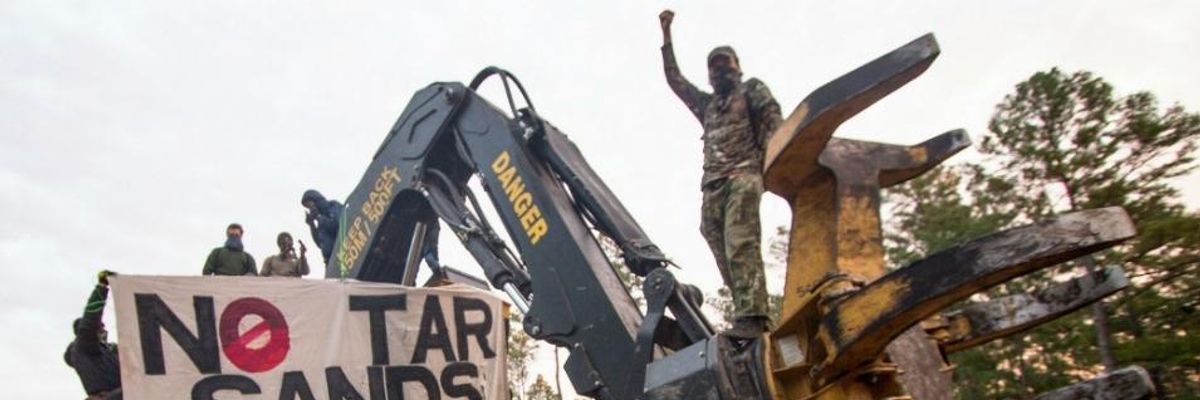The growing tide of tar sands resistance--seen in blockades, tree sits, petitions, education efforts and calls to divest--is having a measurable negative impact on the bottom line of the tar sands industry, according to a new report, prompting researchers to declare that "business as usual for tar sands is over."
Published Wednesday by the Institute for Energy Economics and Financial Analysis and Oil Change International, the report, Material Risks: How Public Accountability Is Slowing Tar Sands Development (pdf), finds that tar sands production revenues were down about $30.9 billion from 2010 through 2013. And according to the report, more than half of that lost revenue, roughly $17 billion, can be attributed to the fierce grassroots campaigns that have sprung up throughout North America in the past few years.
Led in large part by the Keystone XL resistance effort, anti-tar sands campaigns have created numerous delays and cancelled projects which have successfully impacted the bottom line for Canadian oil producers and drilling companies.
"Lack of market access, caused in large part by public accountability actions driven by pipeline campaigns, has played a significant role in the cancellation of three major tar sands projects in 2014 alone: Shell's Pierre River, Total's Joslyn North, and Statoil's Corner Project," notes the report, which is the first in a series of collaborative papers on the tar sands industry to be published by the groups.
Further, the report notes that capital expenditure into tar sands projects are declining while 9 of 10 leading tar sands producers in Canada have underperformed in the broader stock market in the last five years. Meanwhile, financial analysts have recently downgraded their outlook for tar sands production, once estimated to be as much as 4.8 million barrels per days.
"It just so happens that if your business model is predicated on rapid expansion of some of the world's highest carbon oil, then having an impact on your bottom line is one way to keep carbon in the ground."
--Hannah McKinnon, Oil Change International
"Industry officials never anticipated the level and intensity of public opposition to their massive build-out plans," said Steve Kretzmann, Executive Director of Oil Change International, in a press statement. "Public opposition has caused government and its administrative agencies to take a second and third look. Legal and other challenges are raising new issues related to environmental protection, indigenous rights and the disruptive impact of new pipeline proposals."
As report co-author Hannah McKinnon notes, the point of the tar sands resistance campaign "is not to bankrupt the oil industry, it is to protect our climate, and anything that depends on it (i.e. everything), as well as support the front line communities that face the impacts of this industry every single day."
However, she adds, "It just so happens that if your business model is predicated on rapid expansion of some of the world's highest carbon oil, then having an impact on your bottom line is one way to keep carbon in the ground."
Protests against pipelines is slowly tar sands development and thus "changing the bottom line for the tar sands industry," Kretzmann adds. "Business as usual for Big Oil--particularly in the tar sands--is over."

